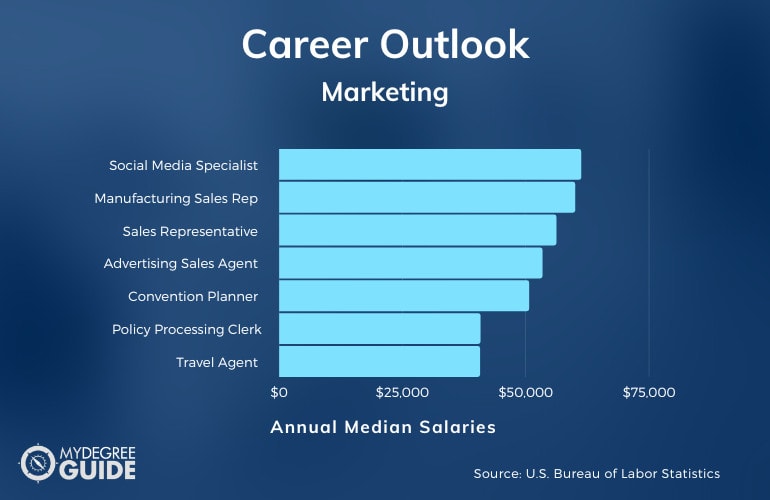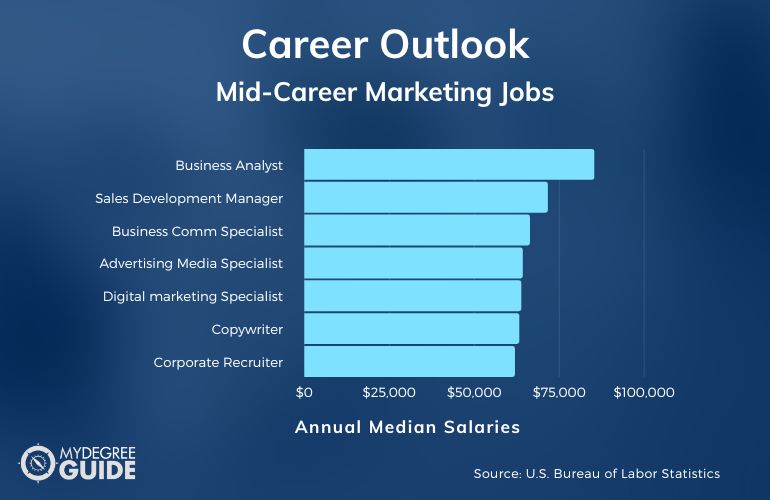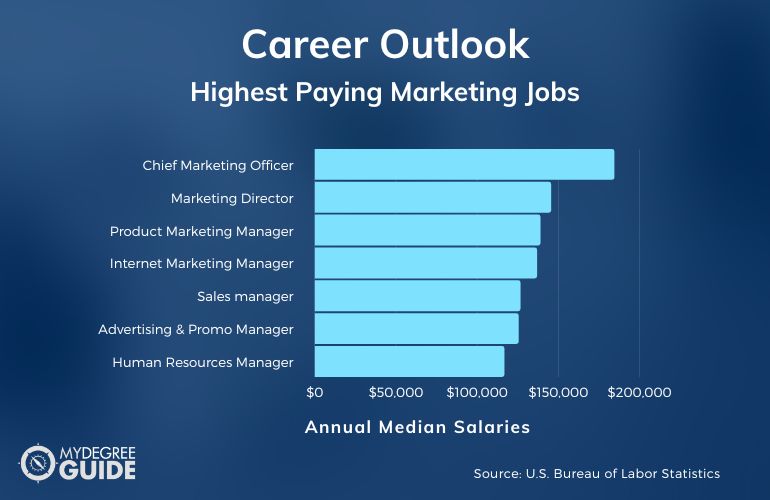What can you do with a marketing degree? There are more options than you might think, and the salaries and employment statistics are on the rise for many different marketing jobs.

Take a look at the different positions and salaries waiting for you. If you have a natural knack as a salesman, this might be the career for you.
Editorial Listing ShortCode:
What Are the Different Types of Marketing Degrees?

These are the most popular types of marketing degrees:
- Bachelor’s in Digital Marketing
- Bachelor’s in International Business Marketing
- Bachelor’s in Marketing Management
- Bachelor’s in Market Research and Analysis
- Bachelor’s in Public Relations
- Bachelor’s in Social Media Marketing
Look for a school that offers the concentration you’re most interested in.
10 Things You Can Do with a Marketing Degree
Here are the top 10 things you can do with a marketing degree.
- Marketing Manager
- Event Planner
- Media Planner
- SEO Specialist
- Public Relations Manager
- Product Manager
- Promotions Manager
- Market Research Analyst
- Admissions Rep
- Fashion Marketer
Click on the online marketing degree you’re most interested in to jump to that section.
1. Marketing Manager

Some marketing managers can make more than $100,000 per year, according to the Bureau of Labor Statistics. Furthermore, overall employment is projected at 6% for the next ten years, which makes marketing a good major for many students. Since it’s a supervisory position, most people have to work their way to the top, or they only qualify for the role after putting in years as a market analyst, product manager, sales manager or marketing assistant.
What does a marketing manager do? Their overall purpose is to sell their company’s products or services, but their day-to-day jobs can differ depending on the person.
For example, they might oversee a single product or product line, or they might juggle multiple advertising campaigns for an entire company. They might receive, analyze, and act on reports from many different creative and financial teams.
To put it another way, marketing managers are the quarterbacks of their department. That’s why they often make good money. It can be a worthwhile career goal for marketing majors; just make sure that you understand it’s a long-term goal rather than an entry-level position.
2. Event Planner

You might be surprised by this one, but event planners handle a lot of marketing. The specifics will depend on your exact job, but here are a few common scenarios:
- You work for an event planning company, and your job is to promote their events, work on their advertisements, or coordinate their guest lists.
- You have your own event planning company, and you need to market your services to potential customers. This is basically an entrepreneurial track where a marketing degree can give you the skills that you need to get your business off the ground.
- You perform market research for event planners. Who would attend this fundraiser? How much is this wedding going to cost? What will be the economic impact of this press conference?
If you’re an efficient, organized person who loves a good party, consider a career in event planning. Your marketing major can help you build a solid foundation for success.
3. Media Planner

Media planners are responsible for marketing campaigns. They’re sometimes known as “brand planners” or “brand strategists.”
They’re usually employed by an advertising agency that hires them out to various clients, but they can also work as an in-house media planner for a specific company, or they can freelance as their own boss.
Media planners might work with many different mediums in their careers, including TV, internet, print, radio, magazines, newspapers, and billboards. They need to be creative, and they need to stay on top of the latest trends to keep their clients relevant.
Just think about how much advertising has changed with the rise of social media in the past decade. Media planners had to adapt, and who knows what’s coming around the corner next? If you’re considering a career in media planning, you’ll need to stay on your toes.
4. SEO Specialist

Search engine optimization (SEO) is the art of refining a website until it ranks high on sites like Google. Since most people don’t scroll very far down search engine results, companies are willing to pay big bucks to make sure that their site is on top.
SEO specialists know all of the tricks to help websites perform better. They understand how search engine algorithms work, and they can take the data and figure out where a site’s traffic is coming from and how to direct it.
SEO specialists occupy a unique role in the marketing world, but their value is growing by the day. SEO jobs are up 43% in recent years, and that number is expected to rise as the world becomes increasingly digital. SEO salaries have increased by 13% as well. It may be a good time to think about specializing.
5. Public Relations Manager

If you know how to schmooze, you might enjoy a career in public relations. A marketing major isn’t required, and many people go into PR fields with business or communication degrees, but a marketing background can be helpful as well.
The point of public relations is to build trust between an organization and the people that it serves or represents. A marketing degree can help you learn how to analyze an audience and figure out what’s going to appeal to them.
Maybe a company needs to re-brand after a failed product launch. Maybe a famous figure needs to handle the fallout from a scandal.
As a public relations expert, you’ll be expected to evaluate the situation and determine the right moves going forward, and you might call on all sorts of data from sales, statistics, demographics, public opinions, and social media trends.
It’s a high-stakes job, and the pressure can be intense. If you’re the type to revel in the action, however, you might thrive in public relations.
6. Product Manager

If marketing managers are the head of the department, product managers are the hands. They’re busy, busy people who usually take charge of a product from start to finish, so they have their fingers in many pies as they coordinate with everyone from first-run sketch artists to finish-line delivery drivers.
You don’t need a marketing degree to become a product manager, but it can help. Your classes can help you propare for the nitty-gritty reality of launching a product. It’s a lot more involved than just taking a good idea and getting someone to build it.
If you’re interested in a career as a product manager, take plenty of business and finance classes and consider a major in marketing. It can help you obtain knowledge and experience to fall back on when it’s time to launch a new invention.
7. Promotions Manager

Have you ever thought about the person behind all of your favorite contests, raffles, and giveaways? Someone has to have the idea before it can become reality. That person is usually a promotions manager.
Promotions managers build up hype for their clients. Whether it’s creating a coupon book or hosting an exclusive fundraiser for high rollers, they take their marketing skills and direct them toward actionable goals that will result in money and media attention.
Promotions managers need to have a mix of both creativity and practicality. They should be able to dream big, but they should also have a good head on their shoulders and a keen eye for detail. If this sounds like you, consider a marketing major with a concentration in promotional management.
8. Market Research Analyst

Instead of doing the advertising themselves, market research analysts look at what other advertisers are doing. They compile data from different brands, companies, and industries, and they present their findings to interested parties.
Their data might include:
- Current trends in the market
- Demographic information on consumers
- Supply and demand statistics
- Results from focus groups
- Reactions to new apps, products, commercials, or service packages
In other words, market research analysts study “the market” and help companies make decisions that will benefit their bottom line. It can be a potentially lucrative career for people who are interested in marketing: The highest-paid market research analysts pulled in $122,630 in the past year, according to the Bureau of Labor Statistics.
9. Admissions Rep

Recruiting students is one of the ways that colleges stay afloat, and admissions representatives are invaluable to the process. They’re the people who get on the phone with prospective students, answer their questions, send them brochures, and connect them with counselors and financial aid experts.
They might also represent their school at college fairs and other events. Admissions reps need to be personable, so if you have good social skills, this is a career where they can come in handy.
Admissions staff might not be the first thing that you think of when you’re considering careers for marketing majors, but it can be a solid choice, and it’s one where you may “sell” your product just as surely as a product manager for a major company.
10. Fashion Marketer

You don’t have to work in a stuffy office to take advantage of your marketing degree. Every industry needs people to advertise their products and services, including the world of fashion.
Fashion marketers work behind the silks and satins. They focus on the business side of things, so their time is spent identifying customers, developing sales strategies, rolling out ad campaigns, and organizing promotional events for designers.
As with many careers, a marketing degree isn’t automatically required for fashion marketers, but it can open doors for the right job applicant. If you have a flair for fashion and good business sense, it might be a career path worth considering.
Marketing Careers & Salaries

Is there a demand for marketing jobs? The short answer is yes.
While some jobs have brighter futures than others, the U.S. Bureau of Labor Statistics has positive outlooks for many different marketing careers. For example, marketing management jobs are growing at a rate of 6% per year. Jobs for market research analysts are growing at a whopping 18% per year.
Salaries are rising as well. Top-tier marketing professionals can clear six figures in a year, especially in large cities like New York and San Francisco. Having a higher level degree like an MBA in marketing online can help increase these numbers even more.
Now may a good time to be looking into marketing jobs.
Entry Level Marketing Jobs

Entry-level marketing jobs are ones that don’t require years of education and experience. You might even be able to land some of them as a student or intern while working on your marketing degree. They may not pay a lot, but they can look good on a resume, and the right jobs can be leveraged into something more. According to the Bureau of Labor Statistics, some careers in the marketing field and their average salaries are:
- Social media specialist ($61,150 per year)
- Wholesale and manufacturing sales representative ($59,930)
- Sales representative ($56,130 per)
- Advertising sales agent ($53,310)
- Convention planner ($50,600)
- Insurance claims and policy processing clerk ($40,750)
- Travel agent ($40,660)
- Reservation and transportation ticket agents and travel clerk ($38,380)
- Correspondence clerk ($38,140)
- Telemarketing sales representative ($26,290)
Consider an entry-level marketing job if you’re a current student or recent grad. They might not be the most glamorous, but they can help you get your foot in the door.
Mid-Career Marketing Jobs

Once you’ve gotten some experience under your belt, it may be time for a promotion. This is the point in your career when you’ll want to start thinking long-term. Where do you see yourself in five years? What titles and salaries are your end goal?
According to the Bureau of Labor Statistics, some careers and their average salaries may include:
- Business analyst ($85,260 per year)
- Sales development manager ($71,598)
- Business communications specialist ($66,340)
- Advertising media specialist ($64,230)
- Digital marketing specialist ($63,790)
- Copywriter ($63,200 per year)
- Corporate recruiter ($61,920)
- Corporate meeting planner ($50,600)
- Sales Clerk Supervisor ($40,350)
As you can see, the paychecks get bigger as you start climbing the corporate ladder, but there’s still further to go if you want a top-dollar marketing career.

You can earn big bucks with the highest-paying marketing jobs. It will probably take you a while to reach this peak, but once you’re at the top of the mountain, you can reap the benefits of both money and seniority. According to the Bureau of Labor Statistics, some high paying careers and their average salaries may include:
- Chief marketing officer ($184,460 per year)
- Marketing director ($145,510)
- Product marketing manager ($138,950)
- Internet marketing manager ($136,850)
- Sales manager ($126,640)
- Advertising and promotions manager ($125,510)
- Human resources manager ($116,720)
- Public relations and fundraising managers ($116,180)
- Data scientist ($94,280)
- Market intelligence analyst ($94,280)
- Art director ($94,220)
- Project management specialist ($73,570)
Keep in mind that these are just average salaries, and highly successful marketing executives can earn twice as much as their peers. For example, while the average pay for a chief marketing officer (CMO) is $184,460, the highest-earning CMOs took home is over $208,000.
Questions Related to Earning a Marketing Degree
Let’s take a look at some of the most common questions related to marketing degrees.
Is a Marketing Degree Good?

Yes, a marketing degree is good for many people. While everyone has their own definition of a “good career,” marketing jobs are definitely worth considering.
There’s a lot of crossover potential with different skills and job titles. You might start in one area of marketing but end up in a completely different one.
Unlike some industries where this is frowned upon, it’s a relatively normal thing in the world of marketing.
How Much Can I Make with a Marketing Degree?
There are marketing jobs available at every skill level, so salaries can range from about $26,000 per year for interns and assistants to over $208,000 per year (Bureau of Labor Statistics) for the top-earning marketing executives.
Which Marketing Jobs Pay the Most?
The highest-paying marketing jobs are managerial positions. They include PR managers, marketing managers, human resources managers, and chief marketing officers.
They usually require years of experience, but their payoffs may be worth it. Their average salaries range from $100,000-150,000, and the top earners can clear more than $208,000 per year (Bureau of Labor Statistics).
Are Marketing Majors in Demand?
Marketing jobs are on the rise. Thousands of jobs are expected to become available over the next ten years, and even the ones with modest growth projections are expected to outpace the national growth averages for other careers.
For example, jobs in sales and promotions are expected to rise 5% over the next decade, and the national average is just 3.7% (Bureau of Labor Statistics). There are even some careers that are on the decline: Their total number of available jobs is decreasing.
Fortunately, marketing jobs aren’t like that. While their growth rates are different, they’re indeed growing.
Is a Marketing Degree Worth It?

Yes, a marketing degree is worth it for many students. The Bureau of Labor Statistics is projecting 5% job growth in management occupations over the next 10 years. Common careers in this field include PR manager, advertising and promotions manager, market intelligence analyst, and business communications specialist.
A marketing career is an investment. Unless you plan on working as an intern for the rest of your life, you’ll probably want to move on to better, higher-paying jobs as your skills increase. This can’t be accomplished in a matter of months. It will likely take years.
If you’re a dedicated student, however, or if you really have a talent for sales, a career in marketing may be quite lucrative. The top earners have very comfortable salaries, and there are many opportunities for advancement.
Consider a marketing degree if you aren’t afraid of working hard to earn big rewards. The right degree program can help you get started in no time, and you’ll be one step closer to a fruitful future.
